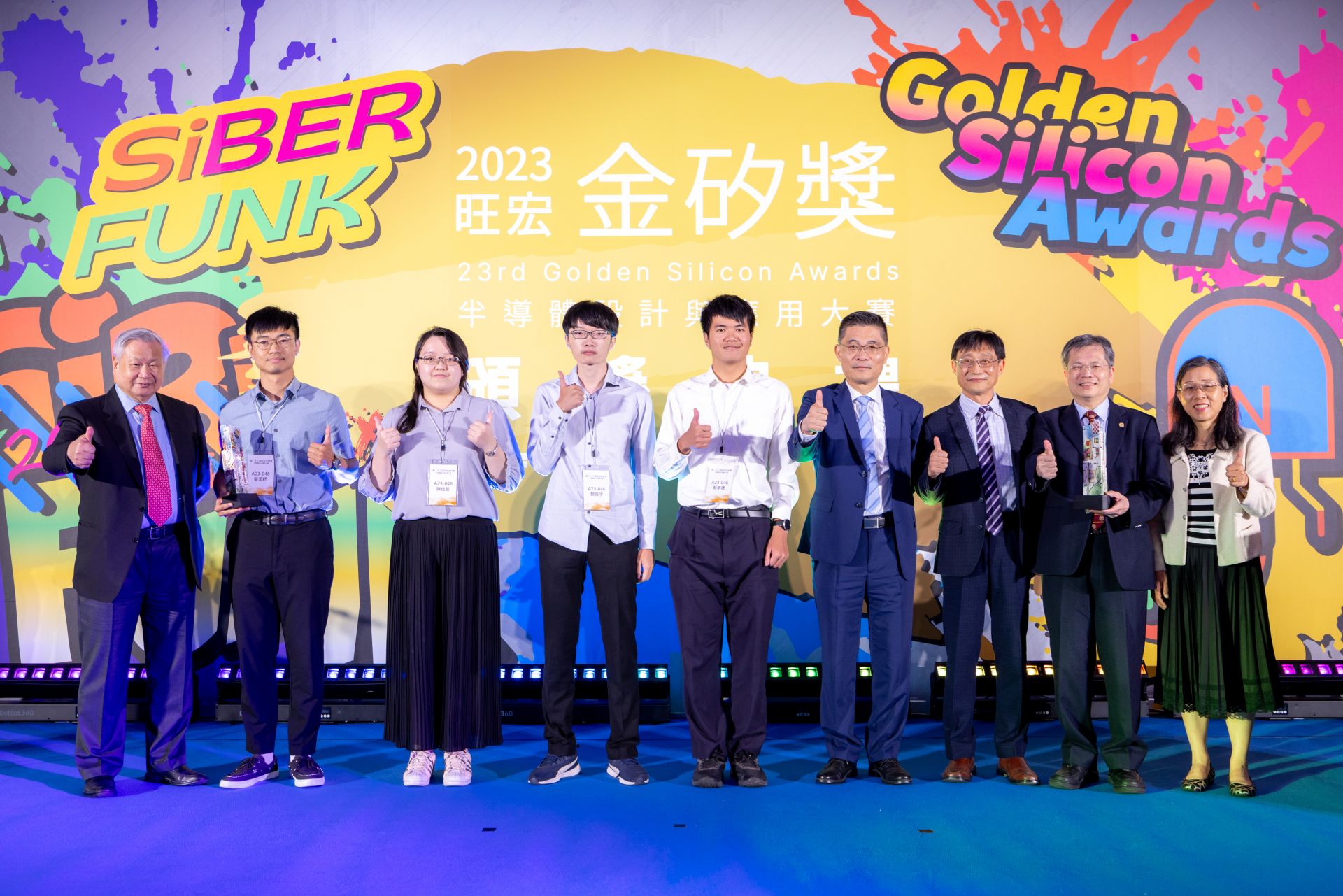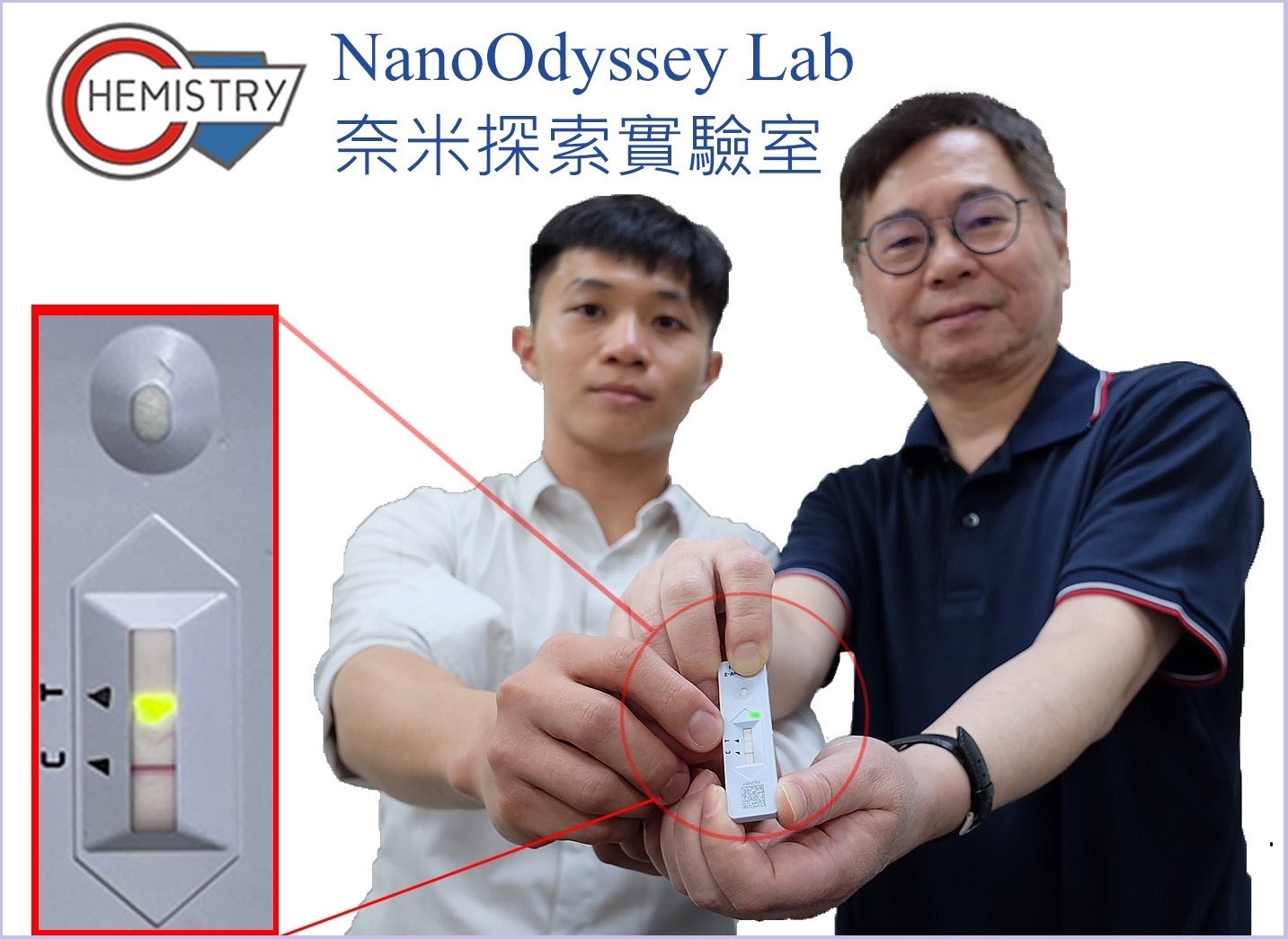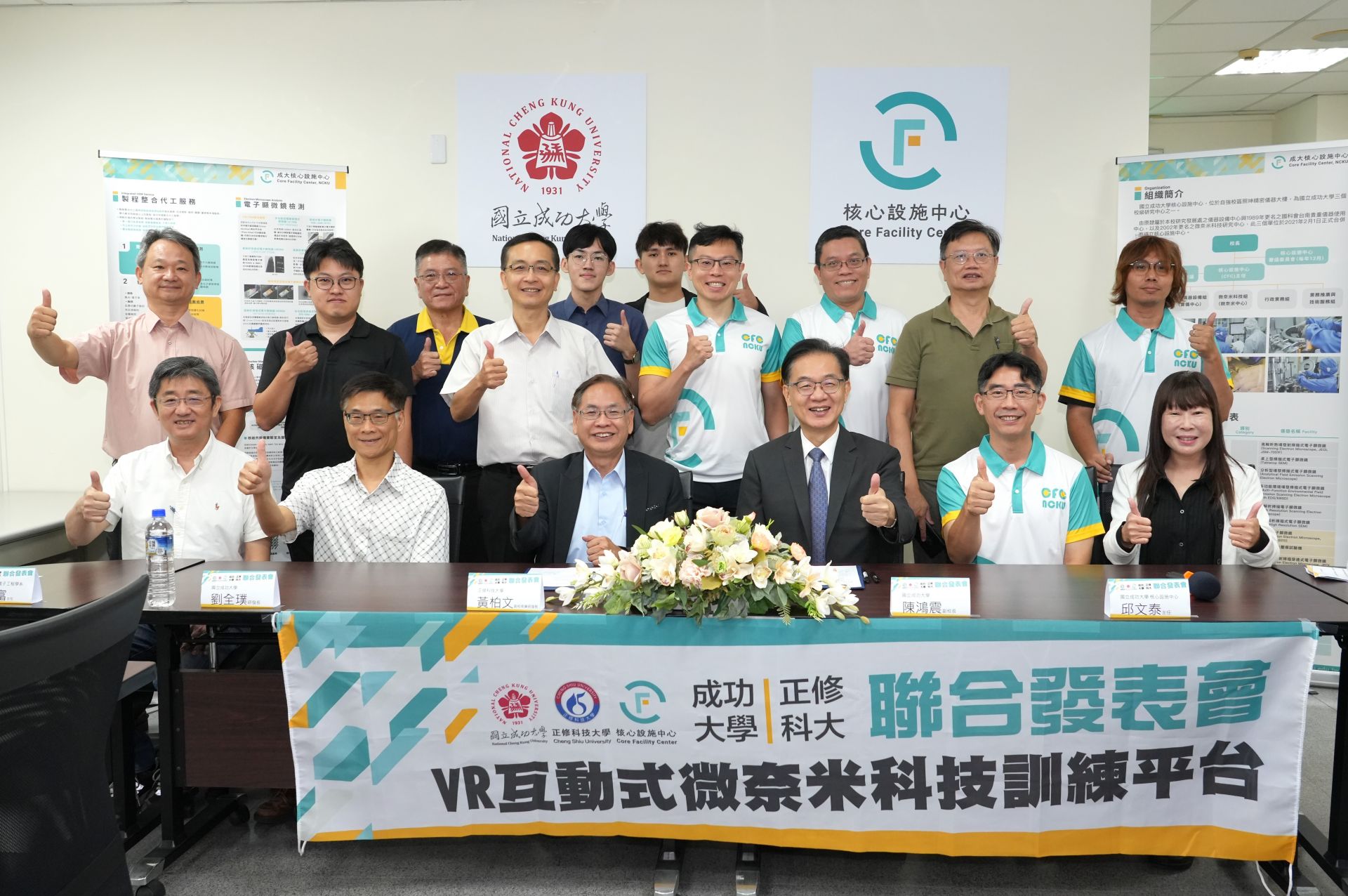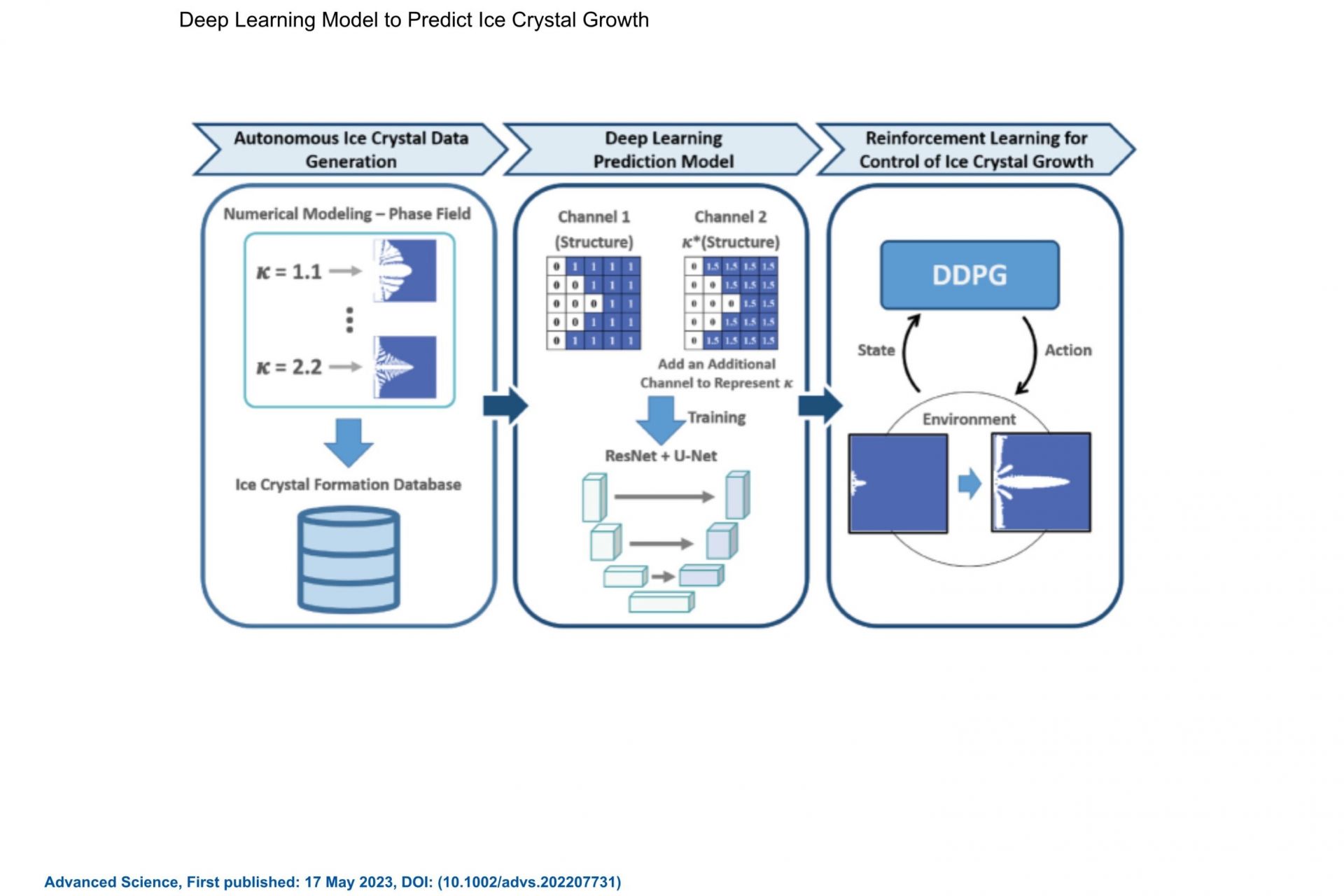SDG9
NCKU interdisciplinary team won the Diamond Award in the Applied Category of the Macronix Golden Silicon Award.
The 23rd Macronix Golden Silicon Award, often regarded as the "Oscars" of electronic and electrical engineering-related departments in Taiwan, held its award ceremony on July 29. A team from National Cheng Kung University (NCKU), collaborating with the Department of Medicine, clinched the Diamond Award in the Applied Category for their project "Wound Healing Analysis and Prediction System Based on Multispectral Light Source Blood Oxygen Imaging Detection," marking NCKU's second win of the top prize since the 17th edition.
The award ceremony for the Macronix Golden Silicon Award - Semiconductor Design and Application Competition took place on July 29, with 35 colleges and universities and 284 teams participating, involving nearly a thousand faculty and students. Professor Chih-Lung Lin, Chair Professor and Department Head of Electrical Engineering at NCKU, and Dr. Yuan-Yu Hsueh, Associate Professor of Surgery and attending physician in plastic surgery at NCKU's College of Medicine, collaborated across disciplines. They executed a 3-year joint project funded by the National Science Council in collaboration with BenQ Materials. The project also involved Dr. Hsin-Yi Tsai, a researcher at the Taiwan Instrument Technology Research Center of the National Applied Research Laboratories, Professor Chien-Hsu Chen, Chair of the Department of Industrial Design and Dean of the College of Planning and Design at NCKU, and Professor Peng-Ting Chen of the Department of Biomedical Engineering at NCKU. Their entry, "Wound Healing Analysis and Prediction System Based on Multispectral Light Source Blood Oxygen Imaging Detection," won the highest honor, the "Diamond Award," and the "Best Creativity Award" in the Applied Category, earning a total prize of NT$530,000.
The NCKU team members who won the Diamond Award in the Applied Category— Meng-Xuan Wu, Jia-Chen Chen, Qing-Yu Zheng, and Chong-De Cai—collaborated across the Institute of Electrical Engineering and the Department of Medicine. Their project involved capturing images of wounds using cameras with specific specifications, resulting in a display of "blood oxygen value" numbers resembling contour lines. Utilizing artificial intelligence algorithms, the system detects the condition of wounds, such as the proportion of tissue necrosis, decay, or granulation, providing physicians with more precise medical instructions or remote treatments, greatly benefiting the care of chronic wounds in patients with bedsores or diabetes.
President Meng-Ru Shen, with many years of clinical experience, personally attended the ceremony to encourage and support the winning team of faculty and students. Representing the winning team, he expressed that NCKU places great emphasis on interdisciplinary research and is the ideal place for such collaborations. He emphasized the importance of this system in providing scientific data to aid clinical judgment on wounds, even for non-medical care personnel. He also highlighted the significance of integrating smart healthcare into clinical practice from the beginning and underscored the indispensable role of interdisciplinary cooperation in the future, which will contribute to fostering connections across disciplines and enhancing research capabilities.
In the face of the strong rise of AI, Min-Chiu Wu, Chairman of Macronix International and the Macronix Education Foundation, stated that when he founded Macronix in 1989, he was already ahead globally in combining statistics and semiconductor knowledge, introducing AI and big data into semiconductor production to improve product quality and shorten development cycles. He was pleased to see that fellow students could implement their creativity and create practical works at the Macronix Golden Silicon Award. He believes that Taiwan's future competitiveness lies in the hands of these students and hopes they will continue to unleash their creativity and create impact.
To encourage students from colleges and universities across the country to engage in innovative research and practical experiences in the semiconductor field, Macronix International and the Macronix Education Foundation have been organizing the Macronix Golden Silicon Award - Semiconductor Design and Application Competition since 2000. The scholarships awarded each year can reach up to NT$3.76 million. Over the past 23 years, more than 5,000 teams and over 18,000 faculty and students from colleges and universities have participated in this competition. Professor Yan-Kun Su of NCKU serves as the convener of the Macronix Golden Silicon Award, inviting nearly a hundred experts from industry, academia, and research to form the judging panel. Additionally, each year, different artists are invited to create the trophies for the event, starting from "creativity" and utilizing different materials, making it the best interpretation of the combination of technological innovation and artistic creation.
The award ceremony for the Macronix Golden Silicon Award - Semiconductor Design and Application Competition took place on July 29, with 35 colleges and universities and 284 teams participating, involving nearly a thousand faculty and students. Professor Chih-Lung Lin, Chair Professor and Department Head of Electrical Engineering at NCKU, and Dr. Yuan-Yu Hsueh, Associate Professor of Surgery and attending physician in plastic surgery at NCKU's College of Medicine, collaborated across disciplines. They executed a 3-year joint project funded by the National Science Council in collaboration with BenQ Materials. The project also involved Dr. Hsin-Yi Tsai, a researcher at the Taiwan Instrument Technology Research Center of the National Applied Research Laboratories, Professor Chien-Hsu Chen, Chair of the Department of Industrial Design and Dean of the College of Planning and Design at NCKU, and Professor Peng-Ting Chen of the Department of Biomedical Engineering at NCKU. Their entry, "Wound Healing Analysis and Prediction System Based on Multispectral Light Source Blood Oxygen Imaging Detection," won the highest honor, the "Diamond Award," and the "Best Creativity Award" in the Applied Category, earning a total prize of NT$530,000.
The NCKU team members who won the Diamond Award in the Applied Category— Meng-Xuan Wu, Jia-Chen Chen, Qing-Yu Zheng, and Chong-De Cai—collaborated across the Institute of Electrical Engineering and the Department of Medicine. Their project involved capturing images of wounds using cameras with specific specifications, resulting in a display of "blood oxygen value" numbers resembling contour lines. Utilizing artificial intelligence algorithms, the system detects the condition of wounds, such as the proportion of tissue necrosis, decay, or granulation, providing physicians with more precise medical instructions or remote treatments, greatly benefiting the care of chronic wounds in patients with bedsores or diabetes.
President Meng-Ru Shen, with many years of clinical experience, personally attended the ceremony to encourage and support the winning team of faculty and students. Representing the winning team, he expressed that NCKU places great emphasis on interdisciplinary research and is the ideal place for such collaborations. He emphasized the importance of this system in providing scientific data to aid clinical judgment on wounds, even for non-medical care personnel. He also highlighted the significance of integrating smart healthcare into clinical practice from the beginning and underscored the indispensable role of interdisciplinary cooperation in the future, which will contribute to fostering connections across disciplines and enhancing research capabilities.
In the face of the strong rise of AI, Min-Chiu Wu, Chairman of Macronix International and the Macronix Education Foundation, stated that when he founded Macronix in 1989, he was already ahead globally in combining statistics and semiconductor knowledge, introducing AI and big data into semiconductor production to improve product quality and shorten development cycles. He was pleased to see that fellow students could implement their creativity and create practical works at the Macronix Golden Silicon Award. He believes that Taiwan's future competitiveness lies in the hands of these students and hopes they will continue to unleash their creativity and create impact.
To encourage students from colleges and universities across the country to engage in innovative research and practical experiences in the semiconductor field, Macronix International and the Macronix Education Foundation have been organizing the Macronix Golden Silicon Award - Semiconductor Design and Application Competition since 2000. The scholarships awarded each year can reach up to NT$3.76 million. Over the past 23 years, more than 5,000 teams and over 18,000 faculty and students from colleges and universities have participated in this competition. Professor Yan-Kun Su of NCKU serves as the convener of the Macronix Golden Silicon Award, inviting nearly a hundred experts from industry, academia, and research to form the judging panel. Additionally, each year, different artists are invited to create the trophies for the event, starting from "creativity" and utilizing different materials, making it the best interpretation of the combination of technological innovation and artistic creation.

A team from NCKU consisting of members from the Electrical Engineering and Medicine fields participated in the Macronix Golden Silicon Awards and proudly clinched the highest honors in the Applied Category, winning both the "Diamond Award" and the "Best Creativity Award."

All award-winning faculty, students, and distinguished guests highly praised the Macronix Golden Silicon Award for its continuous efforts over the past 23 years in nurturing Taiwan's technological talents.

AI, smart healthcare, and third-category semiconductor projects competed fiercely, with Chairman Miin Wu encouraging students to continue investing in advanced research.

SDG9NCKU's groundbreaking nano-scale fluorescent energy bomb represents a major breakthrough in early screening technology.
View more
SDG9NCKU and CSU Collaborate to Launch Taiwan’s First "VR Interactive Micro-Nano Technology Training Platform"
View more



















